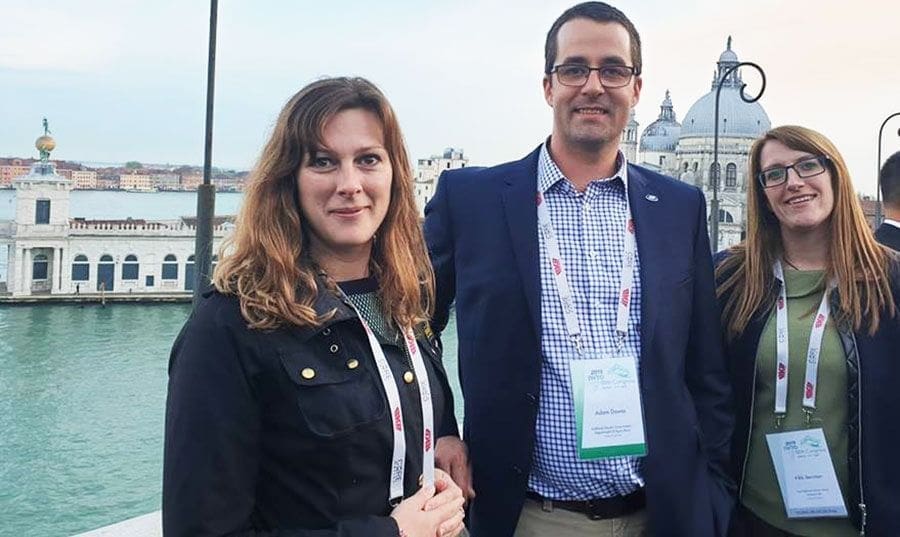Last month, Vikki Berntsen and Farrah Peck of The Falkland Islands Wool Company, along with Adam Dawes of the Department of Agriculture and Robert Hall of Falkland Wool Growers, attended the 88th Congress of the International Wool Textiles Organization (IWTO).
The annual conference, held this year in Venice, Italy, provides an opportunity to bring its members together to strengthen the supply chain of wool textiles and to reinforce the value of wool in the fashion industry and beyond.
Italy, particularly in the production of wool fabrics, has a strong textile tradition and is a leading innovator in the industry. The Congress programme combined the rich wool heritage of Italy with the latest research and developments in applications for wool.
There were more than 320 delegates from all over the world representing all phases of the wool textile chain, discussing topics such as wool sustainability, traceability, wool decoration, and health and wellness. The participants were also invited to visit both The Benetton Group and Marzotto’s headquarters, providing an insight into some of the largest users of fine greasy wool.
The conference provides an excellent opportunity for the Falklands to promote, on an international level, how we can contribute to the wool industry, the background and quality of our product, and to bring back contacts, new interests and what we have learned about global demand.
Despite being only 0.1 percent of the global clip, Falkland Islands wool was very well received throughout the congress. The wool has valuable attributes (bright white, low vegetable matter and high yield compared to other nations) and is highly sought after by the unique storey’ of Falklands wool.
Adam and Vikki gave the Heads of the Delegation an introduction to Falklands wool. This provided an excellent opportunity for some key and influential individuals in the wool industry to promote the ‘Falklands storey’. The presentation included a video portraying the Falklands’ farming, renewal energy, scenery and wildlife, which was extremely impactful and received very positively.
Vikki also secured a place on the Young Professionals programme, allowing her to introduce herself as a representative of the Falkland Islands to the entire delegation on stage.
The Falklands Islands were listed for the first time in a statistical overview (provided by the Department of Agriculture) alongside major wool producing countries such as Australia, New Zealand, South Africa, Argentina and Uruguay.
A substantial amount of interest was generated by Falklands wool, and our unique selling points were reflected in the increasing interest of the industry in sustainability and traceability. We learned that there is now a lot more demand from customers for reassurance about where their woolen clothing comes from and that it has grown sustainably. It is also not possible to ignore the potential harm that animal activist organizations may inflict on the wool industry. This is why the promotion of our good working practices and standards throughout the production of wool, and indeed meat is extremely important. Using the Responsible Wool Standard (RWS) is one instrument to achieve this. This voluntary certification, released in 2016, is applied throughout the entire supply chain, from the farm to the final production of clothing, and provides a guarantee that animals are well treated, that soil health is preserved, that the supply chain is traceable, and that regular audits prove the certification is credible. The importance of networking and promoting the Falklands brand by providing a high-quality product, promoting transparency and collaboration across the industry were the take-home messages. Innovative designs in pharmaceutical packaging, emergency services clothing studies, and eczema sufferers have been introduced beyond the familiar uses of wool in clothing and soft furnishings. It was also extremely exciting to see a presentation by a NASA representative describing why their astronauts chose woolen clothing.
More conscious of the environmental impacts of ‘fast fashion’ and petroleum products that contribute to micro-plastic pollution is the next generation of consumers. Customers want to be more environmentally friendly, and the diversification of wool products puts wool in a good position for the future.

